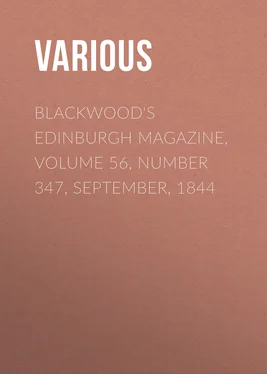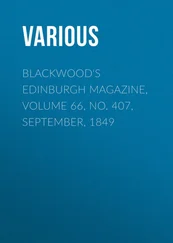Various - Blackwood's Edinburgh Magazine, Volume 56, Number 347, September, 1844
Здесь есть возможность читать онлайн «Various - Blackwood's Edinburgh Magazine, Volume 56, Number 347, September, 1844» — ознакомительный отрывок электронной книги совершенно бесплатно, а после прочтения отрывка купить полную версию. В некоторых случаях можно слушать аудио, скачать через торрент в формате fb2 и присутствует краткое содержание. Издательство: Иностранный паблик, Жанр: foreign_antique, periodic, foreign_edu, на английском языке. Описание произведения, (предисловие) а так же отзывы посетителей доступны на портале библиотеки ЛибКат.
- Название:Blackwood's Edinburgh Magazine, Volume 56, Number 347, September, 1844
- Автор:
- Издательство:Иностранный паблик
- Жанр:
- Год:неизвестен
- ISBN:нет данных
- Рейтинг книги:3 / 5. Голосов: 1
-
Избранное:Добавить в избранное
- Отзывы:
-
Ваша оценка:
- 60
- 1
- 2
- 3
- 4
- 5
Blackwood's Edinburgh Magazine, Volume 56, Number 347, September, 1844: краткое содержание, описание и аннотация
Предлагаем к чтению аннотацию, описание, краткое содержание или предисловие (зависит от того, что написал сам автор книги «Blackwood's Edinburgh Magazine, Volume 56, Number 347, September, 1844»). Если вы не нашли необходимую информацию о книге — напишите в комментариях, мы постараемся отыскать её.
Blackwood's Edinburgh Magazine, Volume 56, Number 347, September, 1844 — читать онлайн ознакомительный отрывок
Ниже представлен текст книги, разбитый по страницам. Система сохранения места последней прочитанной страницы, позволяет с удобством читать онлайн бесплатно книгу «Blackwood's Edinburgh Magazine, Volume 56, Number 347, September, 1844», без необходимости каждый раз заново искать на чём Вы остановились. Поставьте закладку, и сможете в любой момент перейти на страницу, на которой закончили чтение.
Интервал:
Закладка:
And then that insurrection against the mud-carts—what an insight does it give into the wide-spreading and tangled interests of a modern capital! It was impossible to touch the mud of Paris without periling the subsistence of eighteen hundred persons. What more fit, what more innocuous to all parties, it would seem, than to clear away the mud from the streets—to clear it away as soon as possible, that it should not lie there, exhaling pestilence during the heat of the day? But stop—there are in Paris some eighteen hundred persons who gain their bread out of this mud, groping in it, and extracting from it every article of the least commercial value. With a basket slung upon their back, and a crook in their hand to facilitate their search, these chiffoniers are to be seen in every quarter of the city, congregating wherever there is dirt. And now, if all that is thrown out of the houses of Paris is taken away before these industrious persons have had time to search it, what is to become of the whole profession of chiffonerie ? These new mud-carts, with their ruthless sweepers, traversing the city at dawn of day, must be broken up and thrown into the Seine; and it was done so accordingly.
There is a peculiar charm, we think, in having related to us, for the first time, in the shape of history, what we remember to have read and talked over as the news and gossip of the day. We seem to be present at the making of history. We see facts, as the death of princes, which made so much stir and confusion, sink into the commonplace of the historical record; while anecdotes, which were repeated and forgotten, may stand forward as instructive proofs of the temper of the times, and the spirit of the past age. More than one such anecdote we think we could select from the pages before us; but it is possible we might draw them from a purer source than the work of M. Louis Blanc, to which our readers will perhaps think that we have already given more than sufficient space.
A NIGHT ON THE BANKS OF THE TENNESSEE
“Can you tell us how far we are from Brown’s ferry?” said I to a man, who came suddenly and silently upon us from a narrow side-path.
We were on the banks of the Tennessee: the evening was drawing in; the fog, that hung over land and river, was each moment thickening. The landscape had a wild chaotic appearance, and it was scarcely possible to distinguish objects at five paces distance.
The horseman paused some moments before answering my question. At last he replied, accompanying his words with an ominous shake of the head—
“To Brown’s ferry? Perhaps you mean Cox’s ferry?”
“Well, then—Cox’s ferry,” said I, rather impatiently.
“Ay, old Brown is dead,” continued the man, “and Betsy has married young Cox. Ain’t it him you mean?”
“That we know nothing about,” replied I; “but what we wish to learn is, whether we are far from the ferry, and if this is the right road to it.”
“Ah! the way to the ferry—that’s the rub, man! You’re a good five miles off, and might just as well turn your horse’s head another way. I guess you’re strangers in these parts?”
“Heaven preserve us!” whispered my friend Richards, “we are in the hands of a Yankee; he is guessing already.” 3 3 There is no surer way of ascertaining the State from which an American comes, than by his thinkings and guessings. The New-Englander guesses, the Virginians and Pennsylvanians think, the Kentuckian calculates, the man of Alabama reckons.
Meantime the horseman had drawn nearer to us, in spite of the thorns and of the wet boughs, that each moment slapped and slashed him across his face; and he was now close to our horse. As far as we could distinguish through the rapidly-increasing gloom, he was a middle-aged man, bony and long-legged, with a sallow unprepossessing physiognomy surmounting his long ungainly carcass, and metal buttons upon his coat.
“And so you’ve lost your way?” said the stranger after a long pause, during which the thick fog had had the kindness to convert itself into a close penetrating rain. “That’s queer too, seein’ that the ferry ain’t fifteen paces from the road, which runs right along the side of the river. A very queer mistake to be goin’ up the stream, instead of followin’ yer nose and the run of the water.”
“What do you mean?” cried Richards and I in a breath.
“That you’re goin’ up the Tennessee instead of down it, and are on the road to Bainbridge. That’s all!” replied the supposed Yankee.
“On the road to Bainbridge!” repeated we, in voices in which astonishment and vexation were tolerably evident.
“You hadn’t a mind to go to Bainbridge, then?”
“How far is the infernal place from here?” asked I.
“How far, how far?” repeated the man with the metal buttons. “It’s not to say very far, nor yet so very near, as I may guess. Perhaps you know Squire Dimple?”
“I wish you and Squire Dimple were at the devil!” muttered I. But Richards, who took things more quietly, replied—
“No, we have not the honour of his acquaintance.”
“Humph! And whereaway may you be goin’?” enquired our tormentor, who was apparently waterproof.
“To Florence in Alabama,” answered Richards, “and thence down the Mississippi.”
“Ah, fine city, Florence! such as one only finds in this country. Ain’t it now? And a good market, too. Talkin’ of that, what’s the price of flour in the north? You’re come from thereaway, I guess. I did hear it was six and four levies, and Injun corn five and a fip—butter three fips.”
“Are you mad?” cried I, losing all patience, and unconsciously raising my whip as I spoke—“are you stark staring mad, to keep us talking here about flour and butter, and fips and levies, while the rain is falling by bucketsfull?”
“Hallo, stranger!” cried the man, raising himself for the first time out of his lounging position on the saddle. “Guess you’re gettin’ wolfish. I’m for you—stick, fist, or whiphandle, rifle or bowie-knife. Should like to see the man as could leather Isaac Shifty!”
“The road, the road, Mister Isaac Shifty!” interrupted friend Richards in a conciliating tone. There was another long pause.
“I guess you’re traders,” said the fiend at last.
“No, man.”
“And what may you be, then?”
Our answer was followed by another long inspection of our persons and physiognomies. He gazed at us for a couple of minutes or more, examining us from head to foot; at last he spoke.
“And so you’ve a mind to go down the Mississippi?”
“Yes, in the Jackson, which starts to-morrow, we are told.”
“Ah, the Jackson! a mighty good steamboat too—ain’t it now? But I guess you ain’t a thinkin’ of takin’ that thing and your horse with you?” continued the Yankee, pointing to our gig.
“Yes, we are.”
“Oh, you are! Well.—You haven’t seen two women in a dearborn on the road, have you?”
“No, we have not.”
“Well, then,” continued the man in the same indifferent tone, “it’s a’most too late now to get to Bainbridge; and yet you might try it, too. Better turn your horse round, and follow the road till you come to a big walnut-tree; there it divides. Take to the right hand for half a mile, till you come to neighbour Dims’s hedge; then you must go through the lane; and then, for about forty rods, right through the sugar-field; keep to your left till you come to some rocks, but then turn to your right, if you don’t want to break your necks. There’s a bit of a stream there; and when you are over that, the left-hand road will take you straight to Cox’s ferry. You can’t miss it,” concluded he, in a self-satisfied tone, striking his horse a blow with his riding-whip. The animal broke into a smart trot, and in ten seconds our obliging friend had disappeared into the fog.
Читать дальшеИнтервал:
Закладка:
Похожие книги на «Blackwood's Edinburgh Magazine, Volume 56, Number 347, September, 1844»
Представляем Вашему вниманию похожие книги на «Blackwood's Edinburgh Magazine, Volume 56, Number 347, September, 1844» списком для выбора. Мы отобрали схожую по названию и смыслу литературу в надежде предоставить читателям больше вариантов отыскать новые, интересные, ещё непрочитанные произведения.
Обсуждение, отзывы о книге «Blackwood's Edinburgh Magazine, Volume 56, Number 347, September, 1844» и просто собственные мнения читателей. Оставьте ваши комментарии, напишите, что Вы думаете о произведении, его смысле или главных героях. Укажите что конкретно понравилось, а что нет, и почему Вы так считаете.












